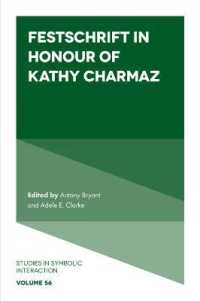- ホーム
- > 洋書
- > 英文書
- > Literary Criticism
基本説明
By uncovering historical data and interpreting literary texts, Professor Esterhammer identifies patterns in the evolving responses of English, German, French, and Russian writers to the experience of improvisation. She explores how improvisation interacts with Romantic ideas about genius, spontaneity, orality, and emotional expressiveness, and relates to evolving concepts of gender and nation. Esterhammer goes on to interpret the influence that the figure of the poetic improviser had in nineteenth-century English and European fiction. In this context, the improvvisatore casts new light on conflicts between poetic genius and socio-economic constraints, and on the evolution of the Bildungsroman.
Full Description
During the Romantic era, especially in Italy, performers known as improvvisatori and improvvisatrici extemporised poetry in public in response to subjects requested by their audiences. This type of performance fascinated Grand Tourists from northern Europe, who reported on poetic improvisers in hundreds of travel accounts, journals, letters, and periodical articles. By uncovering historical data and interpreting literary texts, Professor Esterhammer identifies patterns in the evolving responses of English, German, French, and Russian writers to the experience of improvisation. She explores how improvisation interacts with Romantic ideas about genius, spontaneity, orality, and emotional expressiveness, and relates to evolving concepts of gender and nation. Esterhammer goes on to interpret the influence that the figure of the poetic improviser had in nineteenth-century English and European fiction. In this context, the improvvisatore casts new light on conflicts between poetic genius and socio-economic constraints, and on the evolution of the Bildungsroman.
Contents
1. This lightning of the mind: improvisation and performance in the Romantic era; 2. Defining improvisation and improvising national identity: from grand tourists to Della Cruscans; 3. Importing improvisation: oral performance and print culture in the age of Goethe; 4. Was Homer an improvvisatore?: histories of improvisation in antiquarian scholarship and popular culture; 5. The spectacle of the Romantic improviser: Corilla, Corinne, and British women poets of the 1820s; 6. Stars of the post-Napoleonic stage: Rosa Taddei, Tommaso Sgricci, and their audiences; 7. Byron, Hoffmann, and the improvisational worlds of carnival and commedia; 8. Sociability, social practice, and the Bildungsroman of the 1830s; 9. The improviser's disorder: adventurers and misfits in nineteenth-century fiction; 10. Virtuosi, vaudevillians, mystics, madmen, and rhetoricians: improvisational contexts of the nineteenth century; Afterword.








